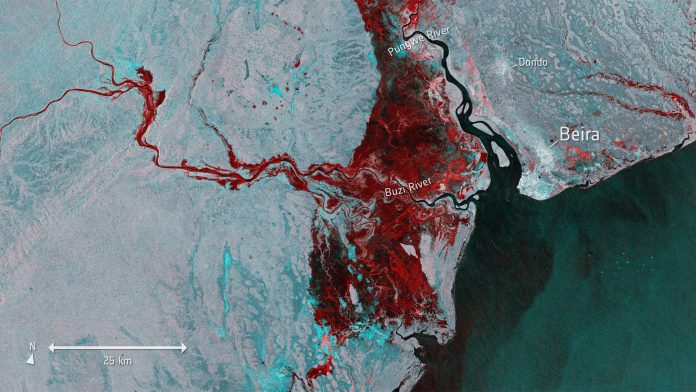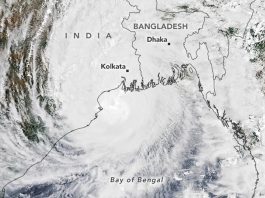Dr Guy Schumann, CEO of RSS-Hydro, spoke to Innovation News Network about the most efficient and effective way of fighting floods at a global scale.
The most sensible way forward in fighting floods at the global scale and minimising devastating impacts on the global economy, regional ecosystems and local communities will be through strategic scientific pathways that foster collaborations with numerous stakeholder organisations to bridge research and innovative practical solutions.
RSS-Hydro is a young R&D company, founded in 2017 and registered in Luxembourg. Its main activities pivot around three business pillars: research, development of science-driven products and expert scientific consulting. RSS-Hydro’s main business consists of developing science-driven products and services focusing on water, floods and flood disasters worldwide, primarily based on computer simulations, Earth Observation and space technologies.
RSS-Hydro’s Research and Education Department is a government-accredited research institute that may receive public funding to host and train PhD students and postdoctoral scholars. RSS-Hydro’s overall mission is to establish a globally influential private R&D centre in flood science, with strategic public-private partnerships, including universities and national research institutions, joint ventures as well as build strong collaborations with a number of international organisations.
RSS-Hydro’s team, including the founder of RSS-Hydro, Dr Schumann, have extensive academic and scientific track-records around the main business of RSS-Hydro.
Filling a market niche
Rivers bursting their banks and flooding adjacent lands is a natural process. However, excessive flooding (in forms such as riverine, coastal, pluvial flash flooding, snowmelt and ice jam flooding), can have devastating impacts with long-lasting effects that are difficult to recover from. Building resilience and protecting against floods is resource-intensive and not easy, particularly with our near future being shaped by climate change, the exact extent and impacts of which are yet to be fully understood. Flooding is unfortunately the top-ranking natural disaster in terms of annual insured and uninsured losses and flood disasters can displace hundreds of thousands of people and destroy people’s homes and livelihoods as well as natural ecosystems.
There is a clear and growing demand from several sectors (public, private, non-governmental and humanitarian) to better respond and prepare for floods and mitigate their impacts by becoming more resilient. In an era of proliferation of geospatial data and services and increasing interoperability between data and models, this should be achievable. However, the excessively growing number of open-access data portals, geospatial analytics platforms, and the multitude of geospatial decision support services offered to respond to, manage and mitigate floods brings confusion to many end-users and decision-makers that often have limited time and resources, low bandwidth and lack the specialised geospatial skill sets required. As a consequence, many of the free open systems and tools available are under-utilised. Yet, many of the potential users, customers and the general public are becoming more science-aware and request even more tailored services that are backed by recent scientific advances.
RSS-Hydro recognises this ‘gap’ as a market niche to better serve science to everyone and engage end-users from a variety of different sectors from the start by assisting them in developing better products for their needs or using new and existing services in a way that produces better actionable information.
Research funding to kick-start business development
Being able to research, develop and offer science-driven services and products is challenging, primarily because staying active in scientific research requires project funding, typically funded by public sources. Many governments and international organisations in Europe and elsewhere, including national funding agencies, the European Commission (EC) and the European Space Agency (ESA), have been offering attractive research and business application programmes also for the private sector, particularly advantageous to small and medium enterprise (SME) businesses.
On the European level, RSS-Hydro is engaging in projects of the Marie Skłodowska-Curie Actions (MSCA), Innovative Training Networks (ITN) and Industrial Fellowships (IF) to strengthen its R&D portfolio while offering students and postdoctoral researchers a place to receive cutting-edge scientific training and start their career. Other international projects that RSS-Hydro collaborates on, include an ESA project where satellite signal anomalies are being used to improve the measurement of high-intense rainfall for better flood hazard mapping.
In Luxembourg, as in many other countries, the government offers financial support for SMEs to develop products and services. In addition, the Luxembourg National Research Fund (FNR) offers attractive private-public partnership research programmes and industrial fellowships for PhD students and postdoctoral researchers. RSS-Hydro has been the recipient of such an industrial postdoctoral fellowship starting this year. Over 24 months, in collaboration with the University of Luxembourg and other partners, RSS-Hydro will research ways in which AI can be used in conjunction with traditional physical process models to better predict flash floods and improve decision support in alerting and protecting against floods. Such national and international funding streams will allow companies like RSS-Hydro to develop and offer better products and services and ultimately build a sustainable business around them.
Multifaceted activities to sustain innovation
Responding as best as possible to a problem of an interdisciplinary nature such as floods and the challenges they bring, requires multifaceted activities and strategic partnerships in order to sustain innovation. To this end, the team at RSS-Hydro is actively engaging in a number of diverse activities, such as assisting flood responses at a global level, expert consultation for the humanitarian and aid development sectors, engaging in innovation initiatives, building strategic partnerships and, last but not least, keeping academic activities a priority.
Assisting flood disaster response at global level requires establishing strong relationships with mandated organisations and NGOs, such as national emergency management agencies. However, it is important not to immediately try and change operations protocols but rather to accompany these organisations during active disasters by assisting or advising them as needed, thereby enabling them to improve their analysis chain and operations – this often needs to happen on a voluntary basis at first. In the context of flood management, mitigation and preparedness, providing expert scientific consultation to aid development organisations for example, is also an important mechanism. This is because it ensures the best possible scientific data or the most adequate analysis methods are being used.
Staying at the top of scientific innovation requires staying active in science, academia and participating in relevant initiatives. For innovation, transparency is crucial and therefore academic, peer-reviewed publications and regular attendance at international scientific conferences are an excellent means. RSS-Hydro also actively supports innovation initiatives, such as the Frontier Development Lab (FDL) run by NASA and also in Europe, through mentoring and supervisory roles. FDL applies AI technologies to space science to push the frontiers of research and develop new tools to solve big scientific and societal challenges. Furthermore, RSS-Hydro is also an active member of the Open Geospatial Consortium (OGC) and regularly participates in innovation testbed initiatives under its Interoperability Program.
Professional networking and building strong business partnerships with other private sector or public entities is also important. In this respect, RSS-Hydro has entered a strategic partnership with Fathom, a young UK-based flood analytics company that is built on a similar premise and is already world-leading in their field. RSS-Hydro is also strongly collaborating with public institutions, such as the Luxembourg Institute of Science and Technology (LIST) and the University of Luxembourg. In addition, the founder of RSS-Hydro, Schumann, currently holds a number of scientific advisory roles on committees of other organisations and associations and is a visiting fellow at the University of Bristol, UK and a research affiliate at the University of Colorado at Boulder, CO, USA. He is also working on a number of NASA-funded projects in the USA at Remote Sensing Solutions Inc. (www.remotesensingsolutions.com/).
Dr Guy Schumann
CEO and Principal Scientist
RSS-Hydro Sarl-S
+352 206005 6301
rss-hydro@outlook.com
www.linkedin.com/company/rss-hydro/about
www.rss-hydro.lu
Please note, this article will feature in the March 2020 issue of our publication.








